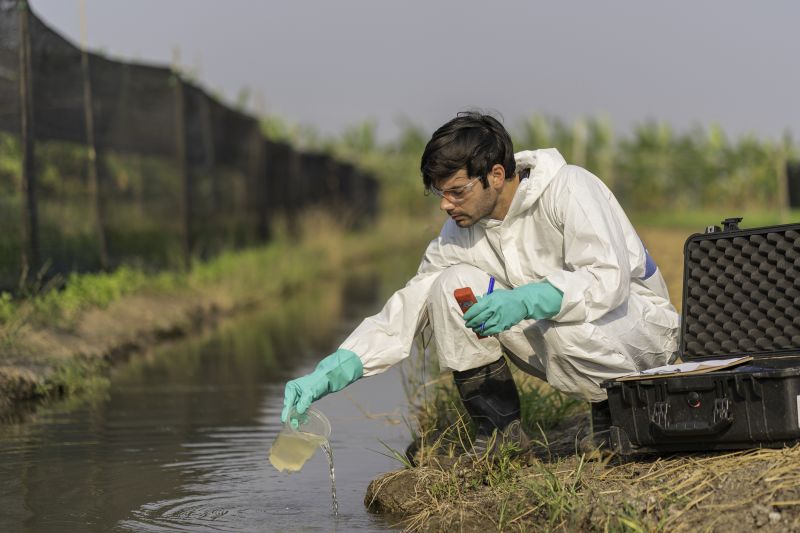Top Products For Well Water Testing You Can Trust
Explore the leading testing kits and tools designed to ensure your well water is safe and clean with ease.
 Ensuring the safety and quality of well water is a critical concern for many homeowners relying on private water sources. Proper testing can help identify potential contaminants and ensure water is safe for daily use. There are various testing products available that cater to different needs, from simple at-home test kits to more comprehensive laboratory analysis options. Understanding the features and capabilities of these products can help users select the most suitable testing method for their specific water conditions.
Ensuring the safety and quality of well water is a critical concern for many homeowners relying on private water sources. Proper testing can help identify potential contaminants and ensure water is safe for daily use. There are various testing products available that cater to different needs, from simple at-home test kits to more comprehensive laboratory analysis options. Understanding the features and capabilities of these products can help users select the most suitable testing method for their specific water conditions.
Types of Products For Well Water Testings
Water Test Strips
Simple and quick, these strips change color to indicate the presence of specific contaminants like pH, chlorine, or nitrates.
Chemical Test Kits
Utilize reagents to test for a variety of substances including heavy metals, bacteria, and chemical pollutants with colorimetric results.
Digital Water Test Meters
Electronic devices that provide digital readings for parameters such as pH, dissolved oxygen, and electrical conductivity.
Laboratory Testing Services
Send water samples to certified labs for comprehensive analysis covering a wide range of potential contaminants.
Bacteria Test Kits
Specifically designed to detect coliform bacteria and E. coli presence in well water samples.
Nitrate and Nitrite Test Kits
Specialized kits to measure nitrate and nitrite levels, important for agricultural areas or well water safety.
Heavy Metal Test Kits
Detect heavy metals such as lead, arsenic, and mercury that may contaminate well water sources.
Total Dissolved Solids (TDS) Meters
Measure the concentration of dissolved solids in water, indicating overall water quality.
pH Test Kits
Determine the acidity or alkalinity of water, which can affect plumbing and water quality.
Chemical Contaminant Test Strips
Quick strips for detecting specific chemical pollutants like pesticides or volatile organic compounds.
Portable Water Testing Devices
Compact, handheld devices suitable for field testing with multiple parameter capabilities.
Water Quality Test Kits for Specific Contaminants
Targeted kits designed to detect particular pollutants relevant to your area or concerns.
Microbial Test Swabs
Swab surfaces or water sources to detect microbial contamination in well systems.
Colorimetric Test Strips
Use color change reactions to identify levels of various water parameters quickly and easily.
Water Testing Kits with Digital App Connectivity
Combine physical testing with digital app analysis for detailed results and record keeping.
Popular Choices
Widely used for quick screening of common water parameters, providing immediate visual results.
Comprehensive kits that include multiple tests for bacteria, chemicals, and physical parameters.
Popular for routine safety checks, these kits help detect microbial contamination efficiently.
Commonly used to monitor overall water quality based on dissolved solids levels.
Frequently chosen by well owners in agricultural regions to monitor nitrate levels.
Popular for detecting potentially harmful metals in well water sources.
Widely used for basic water quality assessment, especially in areas with variable water chemistry.
Commonly used for quick detection of chemical pollutants in well water.
Popular among field inspectors and homeowners seeking on-the-go testing capabilities.
Trusted for comprehensive and detailed analysis, often used as a follow-up to home testing.
Home water testing kits are designed for ease of use and quick results, making them popular among individuals who want to perform routine checks. These kits typically include test strips or reagents that react with specific water contaminants, providing a color-coded indication of water quality. For more detailed analysis, laboratory testing services can offer extensive testing for a wide range of potential pollutants, including heavy metals, bacteria, and chemical contaminants. While laboratory testing may involve additional costs and processing time, it often provides a more thorough assessment of well water safety.
When choosing a testing product, it is important to consider the types of contaminants you want to detect, the ease of use, and the accuracy of results. Some kits are designed specifically for certain contaminants like bacteria or nitrates, while others provide broader screening options. Additionally, the availability of clear instructions, the need for additional equipment, and the method of interpreting results are key factors to evaluate. Regular testing is recommended to maintain water quality and promptly address any issues that arise, ensuring safe and clean water for household use.
Key Buying Considerations
- Identify specific contaminants of concern based on your water source and location.
- Choose testing products that match your technical comfort level, from simple strips to detailed lab analysis.
- Consider the range of parameters tested to ensure comprehensive water quality assessment.
- Evaluate the ease of use and clarity of instructions to facilitate accurate testing at home.
- Check the speed of results and whether the product provides immediate feedback or requires lab processing.
- Assess the need for additional equipment or reagents that may be required for certain tests.
- Review the accuracy and reliability of the testing method, especially for critical contaminants.
- Determine if the kit includes clear interpretation guides or color charts for result analysis.
- Consider the frequency of testing needed to maintain ongoing water quality monitoring.
- Research the reputation and reviews of the product or service to ensure quality standards.
- Verify if the product is suitable for your specific water conditions and contamination risks.
- Look into the availability of customer support or technical assistance if needed.
- Consider the storage and shelf life of testing reagents and strips.
- Evaluate whether the testing method is compatible with your household or field testing environment.
- Check for any additional costs, such as lab fees or replacement parts, associated with the product.
